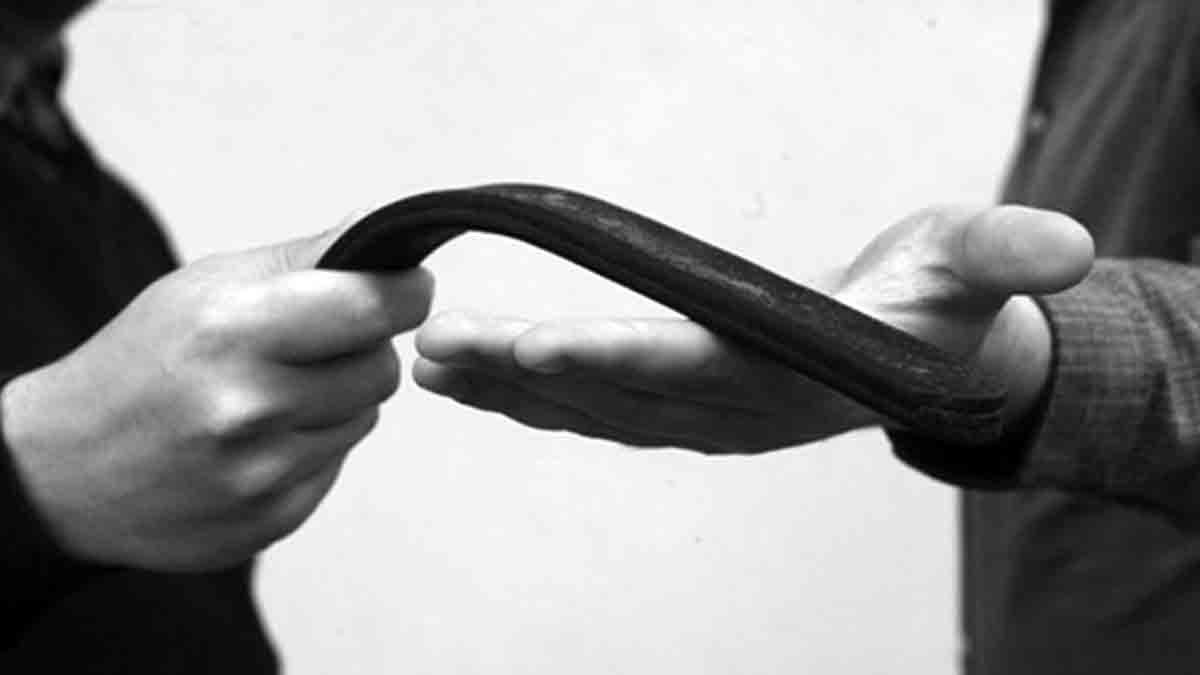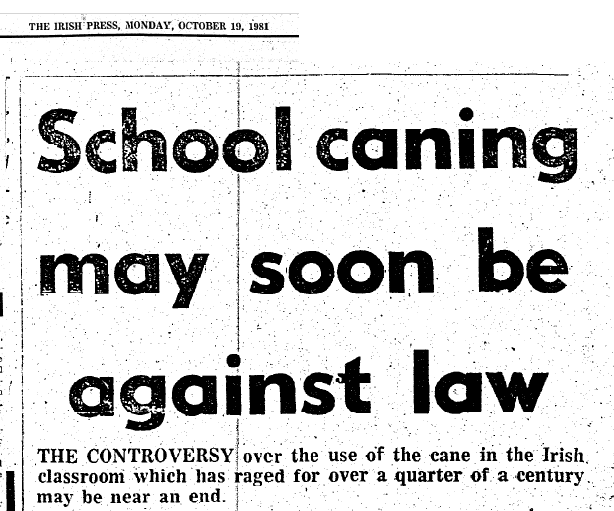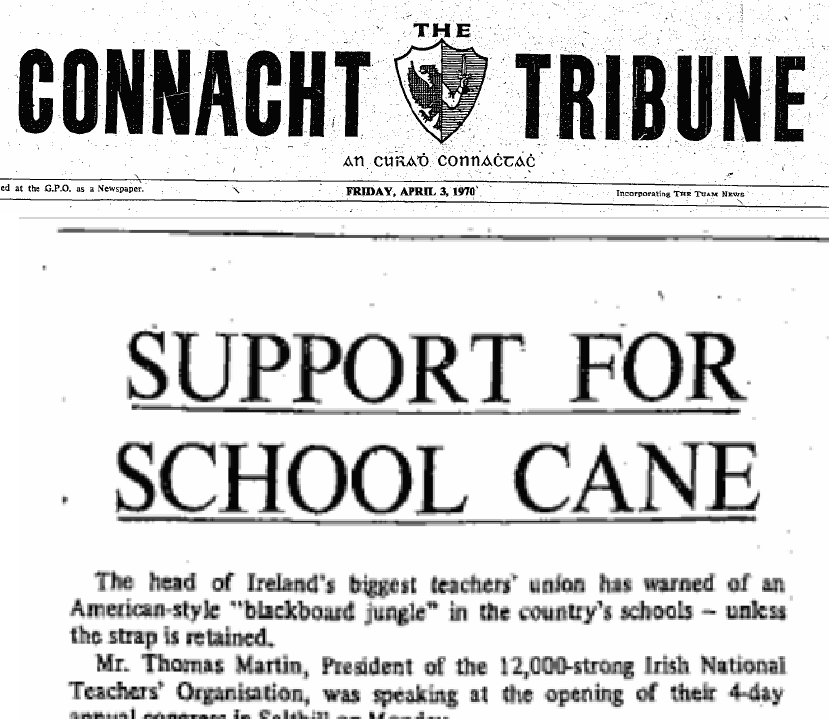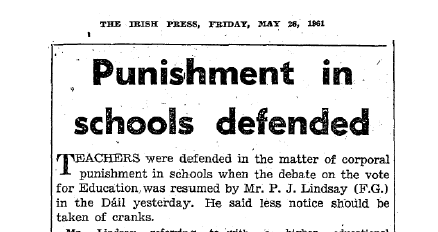
The leather strap was used in almost all Irish schools
Newspaper coverage of the position of the Teacher Unions on Corporal Punishment
Ireland's teachers' unions held varying positions on corporal punishment throughout the 20th century, reflecting broader societal debates about discipline in schools. While the Teachers' Union of Ireland (TUI) opposed physical punishment and welcomed its eventual ban, the Irish National Teachers' Organisation (INTO) and Association of Secondary Teachers Ireland (ASTI) initially defended the practice into the 1980s, with some members arguing it was necessary for maintaining classroom discipline. This defense of an inherently harmful practice against children represents a dark chapter in Irish educational history, even as individual teachers and union members spoke out against corporal punishment long before its official abolition.
-

School caning may soon be against the law - Irish Press 1981
This article is from The Irish Press, Monday, October 19, 1981. Here is the complete text:
School caning may soon be against law
THE CONTROVERSY over the use of the cane in the Irish classroom which has raged for over a quarter of a century may be near an end.
The programme of the Coalition Government envisages the abolition of corporal punishment, and today the Minister for Education, Mr. Boland, is to have consultations with the teaching unions and school managers about finally putting away the now rarely used can for good.
Representatives of the INTO, ASTI and the TUI will attend, along with managers of primary and secondary schools.
Teachers and parents have campaigned down the years for an end to the use of the strap and the cane and in 1969 a petition for abolition submitted to the then Minister for Education, Mr. Lenihan, carried 8,000 signatures.
The Minister for Education in the last government, Mr. Wilson, invited the views of teaching and managerial bodies and found that, in general, they favoured retention of the controversial Department Rule 130 for national schools, which allows the use of the cane in cases of serious misbehaviour.
Corporal punishment is not allowed in vocational community of comprehensive schools, but it is allowed in secondary schools.
The Irish National Teachers' Organisation has favoured retention of Rule 130, although there has been some demand within the union for total abolition and that corporal punishment should be replaced by authority to suspend or dismiss a pupil for very serious breach of discipline.
The Minister will be asked to provide a new code of discipline if the cane is to disappear.
Last year the European Commission on Human Rights found against the British Government in a case involving the use of the strap in Scotland.
-

Support for School Cane - Connacht Tribune 1970
This article is from the Connacht Tribune, April 3rd, 1970
SUPPORT FOR SCHOOL CANE
The head of Ireland's biggest teachers' union has warned of an American-style "blackboard jungle" in the country's schools - unless the cane is retained.
Mr. Thomas Martin, President of the 12,000-strong Irish National Teachers' Organisation, was speaking at the opening of their 4-day annual congress in Salthill on Monday.
He told the 700 delegates in Salthill: "Discipline" is scarcely existing in many U.S. schools. Lethal weapons are carried and teachers and pupils have been subjected to savage assaults.
"Armed police are in attendance to prevent mayhem in corridors and playgrounds. Teachers' organisations are demanding danger money for their members and many are abandoning teaching for other less dangerous occupations."
Mr. Martin, who is principal of a school in Athenry, Killeague, Co. Roscommon, warned against hiding our heads in the sand to ignore trends in other countries.
"Teachers believe the right to inflict punishment, even corporal punishment, for certain grave misdemeanors should be retained and that the vast majority of parents, school managers and the Department for Education concur with this."
"Order, it is said, is the law of Heaven and experienced teachers know children appreciate order and are much happier in the school, where there is reasonable discipline and control."
Mr. Martin conceded that with the gradual introduction of a new and more liberal programme, modern aids and new teaching techniques, school discipline would present fewer problems.
CAMPAIGN
He then attacked a nationwide campaign against corporal punishment led by Dr. Cyril Daly, Howth Road, Dublin and the Reform group and also a recent film made by the American National Broadcasting Corporation on the subject.
He said: "This unscrupulous campaign has caused pain and embarrassment to our friends everywhere and has seriously damaged our image abroad."
"The teachers of this country do not need the gratuitous advice of these pseudo-experts in the field of education, who have never spent an hour in charge of a class of children under modern conditions."
PHASING OUT
Mr. Martin said the phasing out of the present programme for national schools would be welcomed by teachers, pupils and parents everywhere. Narrow and illiberal in content, rigid and inflexible in the manner of its interpretation by the Department officials, it had been with them.
-

Teachers split over ban on school cane - Irish Independent, 27th January, 1982
Teachers split over ban on school cane
By JOHN WALSHE
Education Correspondent
TEACHERS were split last night over the Government's decision to ban corporal punishment in schools from Monday.
Some unions, representing primary and secondary teachers, said the Education Minister should have waited until alternative measures were in place. But the Teachers' Union of Ireland warmly welcomed the decision.
The question of corporal punishment was an effective deterrent to the problem of disruptive pupils.
Announcing the abolition, Minister Boland said that it would apply to all schools receiving financial aid from the Department. But the ban would not apply to schools over which the Government had no control, in particular private schools which themselves or parents would take the initiative.
In the particular case of national schools the rule which allowed corporal punishment would be amended. Ridicule or sarcasm would also be banned.
The Minister acknowledged that setting financial aid would be required as an alternative measure and said that the Government would not be committed to any particular punishment.
Asked about an alternative, he said that the managers, teachers and parents would have to work out what suited their schools.
The Minister has relayed an Irish National Teachers' working party to carry on alternative methods to corporal punishment. The union has agreed to the formation of an inter-professional committee to examine the problems of disruptive pupils in the class.
The teachers last night although divided all stressed that they were not wedded to corporal punishment.
The President of the Association of Secondary Teachers, Ireland, Mr. Finian Fallon, said he was disappointed that the Minister did not consult the teachers' unions and forthcoming. "We waited and waited for a meeting to discuss the convention, something she had promised and now we find it hard to adjust overnight to the new situation." The ASTI had been divided over the cane in a recent survey of members.
There was an unqualified welcome from the Teachers' Union of Ireland which mainly represents teachers in vocational schools, a sector where corporal punishment was not officially permitted anyway.
The Dublin North City Branch of INTO at their annual general meeting last night called for an emergency meeting with the Minister to discuss the ban.
The Dublin branch, which claims a membership of more than 1,000 teachers, said the decision had been because of dissatisfaction with Mr. Boland's stand on corporal punishment in the school a year ago.
-

Punishment in schools defended Irish Press 26-05-1961
Punishment in schools defended
TEACHERS were defended in the matter of corporal punishment in schools when the debate on the vote for Education was resumed by Mr. P. J. Lindsay (F.G.) in the Dáil yesterday. He said less notice should be taken of cranks.
Mr. Lindsay, referring to corporal punishment in the schools, said that when a settlement was announced in a dispute against teachers, the newspapers often reported the allegations in the statement of claim as if they had been proved when in fact they had actually been disproved in court.
He said it would now appear in this world of ‘modern darlings who are the juvenile delinquents’ that when a teacher properly administered punishment the ‘darling’ concerned rushed out of the school hurling abuse at the teacher and saying what his father will do to the so-and-so.
It frequently happened that, in fact, the child had presented no problem until the parents, or "adult delinquent" parent, had done enough to the child to make him uncontrollable.
He did not approve of indiscriminate beating but there was no such indiscriminate beating of children who challenged the authority of the teacher carrying out difficult task in the school. The parents of this country should take less notice of cranks, a more reasonable view and impose punishment within their own home when it was necessary, and not object to the use of punishment by the teacher when necessary.
He would like to hear no more of the liberal approach under which children would be allowed to develop and run around as free as animals. "I know all about these ideas because so many of them are my own, but I am speaking sincerely."
Mr. D. J. O'Sullivan (Lab.) said people spoke of the Commission on Teaching. The INTO on an earlier occasion had expressed agreement with it. "Agreement with it doesn't hurt," but was quoted for several years. He did not think the day was far off when the national teachers would be given a higher educational standard.
He thought it should also be emphasised that there were on the one hand a number of people who agreed the report in favour of not granting parity. It was a body concerned with educational affairs, and one of the fundamental weaknesses of our educational system was that a person could teach in a secondary school at a higher level than a person in a national school with a higher educational standard.
He said there was a further dispute and that when an impasse had been arrived at in previous days the Minister would make a segregation by one side or the other. A suggestion was coming from one side or the other when they were trying to resolve it. "I weakly hint it was a matter where the Minister should step in."
Mr. P. Sherwin (Ind.) said that some teachers had a sadistic streak in them. He knew some teachers who were engaged in business so much that they could not have much interest in teaching.
Gen. R. Mulcahy (F.G.) said he was anxious to see teachers or some others who would have examine the co-existing idea of higher teaching in the national school and the lower reaches of the secondary school curriculum.
Another very important matter was the statement when, on Wednesday morning, the public got the first rate of the Minister's statement of tomorrow. The representatives of the national teachers had come to him and there had been a satisfactory relation about something that appeared to have been done in relation to the Minister's attitude and what was implied by his circular.
Mr. F. Wycherley (Ind.) speaking on the teachers' dispute, said it was a pity that such an application as the Minister had made should have such "hollowness". It was not good service to the children.
Mr. P. Dooley (F.F.) said the announcement by the government of their intention to proceed with the proposal that there should be a common grading for all teachers would bring contentment to the national teachers.
Mr. P. Palmer (F.G.) said he hoped that for the sake of harmony between the Department and the national teachers, the school management and teachers would continue to bring the parties together to obtain a satisfactory solution.
"The teachers, with all members of the I.N.T.O., have always been interested, accepted and respected in the national schools in this country," he said.